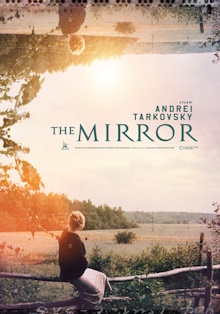This should be the last film we have to watch by Andrei Tarkovsky and good thing too because my wife isn’t eager for any more of his work. It’s probably the most autobiographical of his films and even features his wife Larisa Tarkovskaya and his mother Maria Vishnyakova in supporting roles. One can tell how much of himself he put into it and how intense his feelings are. Yet there’s effectively no plot, no biographic details of his real life and hence nothing solid to hang the emotions on. To us, most of it is just incomprehensible and that goes even for dedicated fans and critics.
Dreamlike sequences documenting parts of the life of Aleksei jump between the past and the present. In the 1930s, he is living in the countryside with his mother Maria and his siblings. His father has been absent for some time and his mother seems to have a somewhat apathetic attitude to life. At one point, they simply watch as a barn burns down. Then again, she works as a proofreader at a printing press and a scene shows her frantically rushing back to check her work, fearful that she has made a mistake. In the present, Aleksei is an adult and appears to frequently quarrel with his aged mother who he thinks is too controlling. His wife Natalia is played by the same actress who plays his mother when she was young and the dialogue explicitly refers to how similar they look. He and Natalia are divorced and their son Ignat lives with his mother. He wants to convince her to let Ignat live with him instead but the boy chooses his mother.
There’s so much more than this of course but it’s all so jumbled and seemingly random. There are wartime scenes with gory injuries for example and inexplicable ones like Chinese people at some kind of protest while Russian guards are holding them back. Interspersed through the film is poetry composed and read by the director’s father Arseny Tarkovsky. Obviously it’s a raw distillation of the director’s own memories of childhood, his feelings about his parents and perhaps even a certain nostalgia for the early years of the USSR. One theme that I found interesting is bemoaning rushing through life without appreciating the moment. That’s a common enough sentiment in artistic personalities but for Aleksei specifically, it seems to contribute to him feeling lost in time and space, unsure of what time it is. Some scenes with him as a child going through a military drill show that his unusual perspective makes him come across as being very strange to others and as an adult he seems sickly.
Tarkovsky is able to pull off memorable cinematic magic in a few shots such as when the wind dramatically blows through a field when a man sets off across it. Yet considering the film as a whole, it’s hard to make enough sense of it to fully comprehend what Tarkovsky was going for, let alone like it. It could well be that you need to be a Russian who has lived through the same period of history as Tarkovsky to be able to draw from the same well of emotions. I can understand why watching this can be an intense experience for some Russians but we just don’t share the same frame of reference. This is probably the Tarkovsky film that I feel the least affection for and I would say most people can skip it because it wasn’t made for them.
